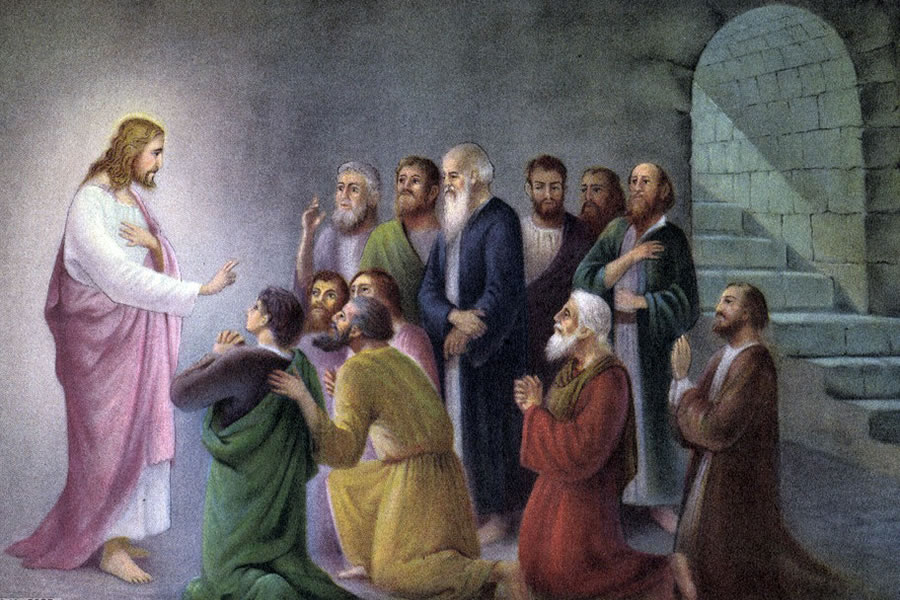St. Francis of Assisi Weekly Reflections

Finding Christ In Others
11-26-2023Weekly ReflectionWe Celebrate Worship Resource, Vol. 48, No. 3In both the first reading and the Gospel, we hear of how shepherds tend their flock, caring for the sick and the lost, eventually judging and separating them. In the first reading from Ezekiel, God is that shepherd, rescuing the sheep from harm, seeking them out when they are lost or strayed, healing them when they are sick or hurt. Throughout his ministry, Jesus was that shepherd—the Good Shepherd—calling his sheep, feeding his sheep, tending his sheep. In today’s Gospel passage, Jesus tells his disciples that they, the sheep, are now to tend one another and that he can be found in the least of their sisters and brothers. We, his disciples, are now the ones who must feed the hungry, welcome the stranger, care for the ill, visit the imprisoned. As we celebrate Christ the King, may we recommit ourselves to our calling so that one day we can face our King, our Good Shepherd, knowing that we have served him in our brothers and sisters in need.
What corporal works of mercy will you do this week? How can you better see the Lord in your neighbor in need?
Encontrando A Cristo En Los Demás
Tanto en la primera lectura como en el Evangelio, escuchamos cómo los pastores cuidan de su rebaño, cuidan de los enfermos y los perdidos, y eventualmente los juzgan y separan. En la primera lectura de Ezequiel, Dios es ese pastor que rescata a las ovejas del mal, las busca cuando están perdidas o descarriadas, las sana cuando están enfermas o heridas. A lo largo de su ministerio, Jesús fue ese pastor—el Buen Pastor—que llamaba a sus ovejas, las alimentaba, las cuidaba. En el pasaje del Evangelio de hoy, Jesús dice a sus discípulos que ellos, las ovejas, ahora deben cuidarse unos a otros y que él se puede encontrar entre sus hermanas y hermanos. Nosotros, sus discípulos, somos ahora quienes debemos alimentar al hambriento, acoger al desconocido, cuidar al enfermo, visitar al encarcelado. Al celebrar a Cristo Rey, que podamos volver a comprometernos con nuestro llamado para que un día podamos enfrentar a nuestro Rey, nuestro Buen Pastor, sabiendo que lo hemos servido en nuestros hermanos y hermanas necesitados.
¿Qué obras de misericordia corporales harás esta semana? ¿Cómo puedes ver mejor al Señor en tu prójimo necesitado?
The Final Judgment
11-26-2023Question of the WeekReading I: Ezekiel 34:11-12, 15-17 - Parable of the shepherds
Reading II: 1 Corinthians 15:20-26, 28 - Christ, the first fruits
Gospel: Matthew 25:31-46 - The last judgment
Key Passage: [The Son of Man] will answer them, “Truly I tell you, just as you did not do it to one of the least of these, you did not do it to me.” (Matthew 25:45)
Adults: In what ways is Jesus the ruler of your life?
Kids: How can you show that you honor Jesus as the king of your life?
El Jucio Final
Lectura I: Ezequiel 34:11-12, 15-17 - Parábola de los pastores
Lectura II: 1 Corintios 15:20-26, 28 - Cristo, las primicias
Evangelio: Mateo 25:31-46 - El juicio final
Pasaje Clave: [El Hijo del Hombre] les responderá: “Yo les aseguro que, cuando no lo hicieron con uno de aquellos mas insignificantes, tampoco lo hicieton conmigo”. (Mateo 25:45)
Adultos: ¿De qué manera Jesús es el gobernante de tu vida?
Niños: ¿Cómo puedes demostrar que honras a Jesús como el rey de tu vida?
Using Your Gifts
11-19-2023Question of the WeekReading I: Proverbs 31:10-13, 19-20, 30-31 - The ideal wife
Reading II: 1 Thessalonians 5:1-6 - The need for preparation
Gospel: Matthew 25:14-30 - Parable of the silver pieces
Key Passage: [The servant said,] “Master, you handed over to me five talents; see, I have made five more talents.” His master said to him, “Well done, good and trustworthy slave; you have been trustworthy in a few things, I will put you in charge of many things; enter into the joy of your master.” (Matthew 25:20b–21)
Adults: What gift have you not developed as you had hoped? What could you still do?
Kids: What gift has God given you? What do you want to do with it?
Usando Tus Dones
Lectura I: Proverbios 31:10-13, 19-20, 30-31 - La esposa ideal
Lectura II: 1 Tesalonicenses 5:1-6 - La necesidad de preparación
Evangelio: Mateo 25:14-30 - Parábola de las piezas de plata
Pasaje Clave: [El siervo dijo:] “Señor, cinco talentos me entregaste; mira, he hecho cinco talentos más”. Su amo le dijo: “Bien, siervo bueno y digno de confianza; en poco has sido confiable, en mucho te pondré; entra en el gozo de tu señor”. (Mateo 25:20b-21)
Adultos: ¿Qué don no has desarrollado como esperabas? ¿Qué podrías hacer todavía?
Niños: ¿Qué regalo te ha dado Dios? Que quieres hacer con eso?

Good and Faithful Servant
11-19-2023Question of the WeekWe Celebrate Worship Resource, Vol. 48, No. 3Like last week’s parable about the ten virgins and their lamps, today’s parable teaches us to be prepared for when the Lord returns. Last week, however, even the young women with plenty of oil for their lamps fell asleep while they waited. Not allowed today! The two servants rewarded today take the talents they were given (even one talent is as significant sum of money) and use them to them to make more. Now remember that this is a parable. It is no more a lesson about making money than last week’s was about lighting lamps. No, Jesus is teaching us that it is not enough to always be vigilant. While we wait we must use wisely what has been entrusted to us. Jesus has given us a great gift: the Good News of the kingdom of heaven, where God’s unbounded mercy and infinite love manifest themselves for us all. He does not want us to bury it in the ground. He wants us to realize it, to share it, and to put it into practice. Then at the end of our days we may hope to be greeted, “Well done, my good and faithful servant...Come, share your master’s joy (Matthew 25:21).
How can you use the talents God has given you to share the Good News with others?
Un Siervo Bueno Y Fiel
Al igual que la parábola de la semana pasada sobre las diez vírgenes y sus lámparas, la parábola de hoy nos enseña a estar preparados para cuando el Señor regrese. La semana pasada, sin embargo, incluso las mujeres jóvenes que tenían mucho aceite para sus lámparas se durmieron mientras esperaban. ¡Esto no esta permitido hoy! Los dos sirvientes recompensados hoy toman los talentos que se les dio (incluso, un talento, es una suma importante de dinero) y los usan para ganar más. Recuerda que esto es solo una parábola. No es una lección de cómo ganar dinero como tampoco la semana no era de como encender lámparas. No, Jesús nos está enseñando que no basta con estar siempre vigilantes. Mientras esperamos debemos usar sabiamente lo que se nos ha confiado. Jesús nos ha dado un gran regalo: la Buena Nueva del reino de los cielos, donde la misericordia ilimitada y el amor infinito de Dios se manifiestan para todos nosotros. No quiere que lo enterremos bajo tierra. Quiere que lo realicemos, lo compartamos y lo pongamos en práctica. Entonces, al final de nuestros días, podemos esperar ser recibidos como: “Un siervo bueno y fiel...Ven y comparte el gozo de tu señor (Mateo 25:21).
¿Cómo puedes usar los talentos que Dios te ha dado para compartir las Buenas Nuevas con otros?

Are You Prepared?
11-12-2023Weekly ReflectionWe Celebrate Worship Resource, Vol. 48, No. 3Today we hear Jesus compare the kingdom of heaven to ten young women who are responsible for going out to meet the bridegroom when he comes. He is delayed and the lamps of five begin to go out. Desperate for more oil, they leave to buy more just as the bridegroom approaches. Returning with lamps well lit, they discover it’s too late. The door is barred. The lesson: We must always be prepared for the arrival of the kingdom. The five foolish virgins were not. And the door was barred because at the critical time . . . they had left! They did not consider that they might have been welcome, even with lamps that were sputtering out. They missed their chance to meet the Lord because they judged themselves unworthy. The fact is, no matter how wellprepared we are, we are all unworthy. Perhaps those five should have stayed and pleaded for the Lord’s mercy. We have seen the Lord have mercy on those who ask for it. So even as we try to always be prepared, let us take consolation in the words Paul used to reassure those who begin to lose hope due to delay in the Lord’s coming: “[do] not grieve like the rest . . . the dead in Christ will rise” (1 Thessalonians 4:13, 16).
How often do you think that your life on earth may end any day? What gives you comfort when you think that?
¿Estas Listo?
Hoy escuchamos a Jesús comparar el reino de los cielos con diez mujeres jóvenes que son responsables de salir al encuentro del novio cuando él venga. El se retrasa y las lámparas de cinco empiezan a apagarse. Desesperadas por conseguir más aceite, salen a comprar más justo cuando se acerca el novio. Al regresar con las lámparas bien encendidas, descubren que es demasiado tarde. La puerta está cerrada. La lección: Siempre debemos estar preparados para la llegada del reino. Las cinco vírgenes insensatas no lo fueron. Y la puerta estaba cerrada porque en el momento crítico. . . ¡ellas se fueron! No consideraron que podrían haber sido bienvenidos, incluso con las lámparas apagadas. Perdieron la oportunidad de encontrarse con el Señor porque se consideraron indignos. El hecho es que, por muy bien preparados que estemos, todos somos indignos. Quizás esas cinco deberían haberse quedado y suplicar la misericordia del Señor. Hemos visto al Señor tener misericordia de quienes la piden. Así que, aunque tratemos de estar siempre preparados, consolémonos con las palabras que Pablo usó para tranquilizar a aquellos que comienzan a perder la esperanza debido a la demora en la venida del Señor: “no vivan tristes. . . los que murieron en Cristo resucitarán” (1 Tesalonicenses 4:13, 16).
¿Con qué frecuencia piensas que tu vida en la tierra puede terminar cualquier día? ¿Qué te consuela cuando piensas eso?
Actions And Consequences
11-12-2023Question of the WeekReading I: Wisdom 6:12-16 - The availability of wisdom to those who seek
Reading II: 1 Thessalonians 4:13-18 - Resurrection of the dead
Gospel: Matthew 25:1-13 - Parable of the ten virgins
Key Passage: “Now he is God not of the dead, but of the living; for to him all of them are alive.” (Luke 20:37–38)
Adults: We meet Christ sometimes when we least expect it. How can you be ready to see him in all the ways he is present?
Kids: What are some surprising ways in which you meet Christ in your daily life?
Acciones Y Consecuencias
Lectura I: Sabiduría 6:12-16 - La disponibilidad de la sabiduría para quienes la buscan
Lectura II: 1 Tesalonicenses 4:13-18 - Resurrección de los muertos
Evangelio: Mateo 25:1-13 - Parábola de las diez vírgenes
Pasaje Clave: “Él, pues, no es Dios de muertos, sino de vivos; porque para él todos están vivos”. (Lucas 20:37–38)
Adultos: A veces nos encontramos con Cristo cuando menos lo esperamos. ¿Cómo puedes estar preparado para verlo en todas las formas en que está presente?
Niños: ¿Cuáles son algunas formas sorprendentes en las que encuentras a Cristo en tu vida diaria?

Whoever Humbles Himself Will Be Exalted
11-05-2023Weekly ReflectionWe Celebrate Worship Resource, Vol. 48, No. 3After criticizing the scribes and the Pharisees for refusing to practice what they preach in today’s Gospel, Jesus not only teaches his disciples how to act, he leaves them with an example of practicing what one preaches that will bear fruit in the most spectacular way in a very short time. Jesus decries those who demand honors and recognition while burdening those they should be serving. Jesus, instead, shoulders the burdens of those he serves. When he knelt down to wash his disciples’ feet, he put into practice the words we hear from him today: “The greatest among you must be your servant” (Matthew 23:11). Then, in dying on the cross and being raised to new life, Jesus accomplished the final line of this passage: “whoever humbles him [or herself] will be exalted” (23:12). Jesus teaches them to proactive what they preach by going out and practicing what he’s preached to the ultimate extent. It is now up to us to be the servant of all, to act humbly, to kneel down to serve those to serve those in need, and to take upon ourselves the burdens of those who suffer. Following Christ demand it.
When have you failed to practice what you preached? What can you do to put your faith into action?
El Que Se Humilla Será Enaltecido
Después de criticar a los escribas y fariseos por negarse a practicar lo que predican en el Evangelio de hoy, Jesús no sólo enseña a sus discípulos cómo actuar, sino que les deja un ejemplo de práctica de lo que se predica que dará frutos de la manera más espectacular en un muy poco tiempo. Jesús condena a quienes exigen honores y reconocimientos mientras agobian a quienes deberían servir. Jesús, en cambio, carga con las cargas de aquellos a quienes sirve. Cuando se arrodilló para lavar los pies de sus discípulos, puso en práctica las palabras que escuchamos de él hoy: “El mayor entre ustedes será su servidor” (Mateo 23:11). Luego, al morir en la cruz y resucitar a una nueva vida, Jesús cumplió la línea final de este pasaje: “el que se humilla será enaltecido” (23:12). Jesús les enseña a ser proactivos en lo que predican saliendo y practicando lo que él predica al máximo. Ahora nos corresponde a nosotros ser servidores de todos, actuar con humildad, arrodillarnos para servir a los necesitados y asumir las cargas de los que sufren. Seguir a Cristo lo exige.
¿Cuándo has dejado de practicar lo que predicabas? ¿Qué puedes hacer para poner tu fe en acción?
Sincerity Of Heart
11-05-2023Question of the WeekReading I: Malachi 1:14b-2:2b, 8–10 - Punishment for imperfect sacrifices
Reading II: 1 Thessalonians 2:7b-9, 13 - Paul’s sincerity
Gospel: Matthew 23:1-12 - Hypocrisy of the scribes and Pharisees
Key Passage: Jesus said, “Therefore, do whatever they teach you and follow it; but do not do as they do, for they do not practice what they teach.” (Matthew 23:3)
Adults: Is there an area of your life in which you sometimes feel like a hypocrite?
Kids: Why is it important for you to live according to how you believe?
Sinceridad De Corazon
Lectura I: Malaquías 1:14b-2:2b, 8–10 - Castigo por sacrificios imperfectos
Lectura II: 1 Tesalonicenses 2:7b-9, 13 - La sinceridad de Pablo
Evangelio: Mateo 23:1-12 - Hipocresía de los escribas y fariseos
Pasaje Clave: Jesús respondió: “Ama al Señor tu Dios con todo tu corazón y con toda tu alma y con toda tu mente”. Este es el primer y mayor mandamiento. Y el segundo es semejante a este: Amarás a tu prójimo como a ti mismo. (Mateo 22:36-40) Adultos:En un sentido práctico, ¿qué cosa cambiaría en tu vida si amaras a tu prójimo como a ti mismo?